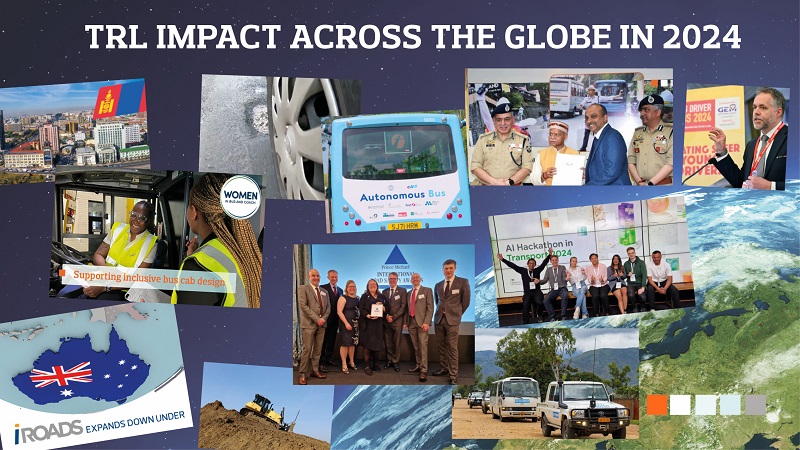Reflecting on the past year, the impact of TRL’s mission is clear to see; it helps to take a different perspective in order to appreciate it.
Let’s begin in space. The European Space Agency has funded trials of using commercially available earth observation data and some clever AI to assess the condition of unpaved roads in the remotest and inhospitable places on Earth, where roads and bridges transform the prosperity of nations by linking communities.
Road safety specialists from both our UK and India offices have been working on the ground in Kenya, Mozambique, Ghana, Bangladesh, Kerala, Mongolia and Nepal supporting local highways engineers and first responders to embed the vital Safety Pillars that will reduce road deaths and injuries. This work, a core component of the United Nations’ Sustainable Development Goals, is funded by diverse sources such as the World Bank, the Asian Disaster Preparedness Center (ADPC), and the World Road Association. Proven policies, adoption of design principles, and a commitment to a mix of innovation and sustainable interventions will save thousands of lives across future generations in these Lower & Middle Income Countries (LMICs).
A new partnership with NTRO in Australia and ongoing collaboration with the New Zealand Transport Agency Waka Kotahi has extended the application of TRL expertise into the Pacific region. Primary research for John Hopkins University in the USA underpins the leadership of the Transportation Security Administration in road safety regulation.
Sounds a bit grandiose? On a more human level, we work on a practical level with organisations like the UNHCR to help keep their workers safe on the wild and hostile roads they travel daily to assist communities in crisis.
Work has continued this year on Road Note 31 – possibly the most influential guidance ever produced by TRL. First issued in 1961, it aids highways engineers to design and build sustainable, affordable road networks in tropical and sub-tropical climates. With climate change now affecting the whole planet, RN 31 is compulsory reading for anyone interested in pavement materials and the principles of network resilience.
Behind the scenes, TRL consultants also sit on a lot of committees. The fundamental goal here is to align nations as they progressively strive to make their transportation and mobility systems cleaner, safer and more accessible.
In Europe, we are thrilled to be actively working again on Horizon 2020 projects, and supporting the European Commission on harmonising regulations for vehicle emissions, novel mobility solutions, and drowsy driver detection systems. TRL continues its collaboration with other national agencies via CEDR on the exploitation of new infrastructure condition sensing technologies.
At home in the UK, the fashionable topics which have exercised our advisors this year range from suicide prevention on road and rail networks; how to safely connect automated vehicles to infrastructure using shared spectrum; and how to legalise the use of electric scooters on public roads. We’ve continued the highly enjoyable journey to encourage greater adoption of driverless construction machines, and been around the country interviewing female bus drivers to figure out how to design better cab spaces for them, so more women can enter the the bus and coach driver profession. The much anticipated PAS2161 (authored by TRL and published by BSI) sets out an all new specification for the collection and reporting of road condition data by Local Authorities, exploiting a host of novel technologies. A joint report exploring what needs to be done to make self-driving buses and taxis accessible and appealing to people with disabilities has been well received and is set to spearhead constructive change.
Behind everything – reports, spreadsheets, evaluations, trials, toolkits, software applications – are people. TRL people are special because TRL is a special place to work. As a social purpose enterprise we seek to collectively make a real difference, but individuals don’t seek publicity. However, as part of an annual retrospective, it feels only fair to draw attention to a few people who have been recognised and honoured this year. Starting with a combined team from TRL and Transport for London, who received the most prestigious accolade in the road safety field: the Prince Michael International Road Safety Award, for TfL’s Bus Safety Standard. Tony Mathew received an award from the Governor of Himachal Pradesh, in recognition of the work undertaken in supporting the state to save lives. Dr George Beard was nominated by Zag Daily as one of their Top 50 Mobility Changemakers: industry leaders fuelling the sustainable transport shift. And finally, youth trumped experience when a TRL team of bright sparks won this years’ Dept for Transport Hackathon with a method to reconstruct the timeline of road collisions by applying computer vision and AI to CCTV footage.
When people ask “What does TRL do?”, it can be hard to know where to start, and this review barely scratches the surface. With a long lens, the answer is simple: we help make the world a better place.

